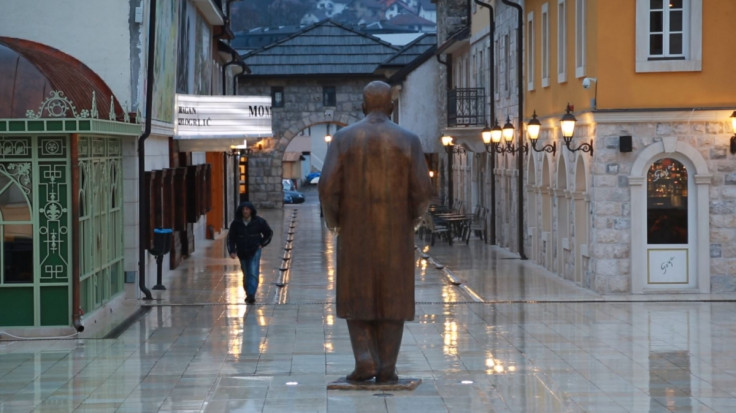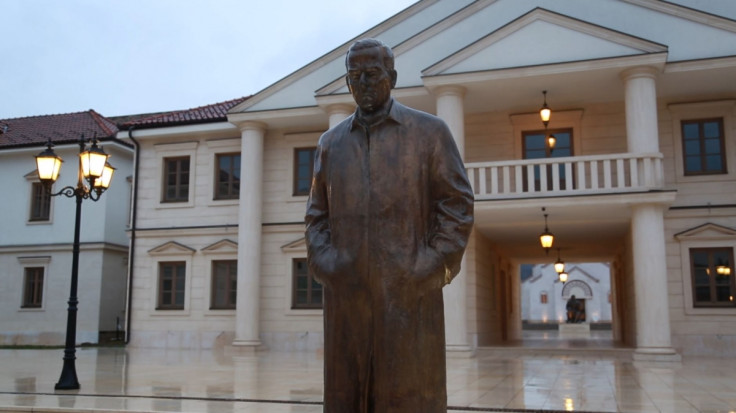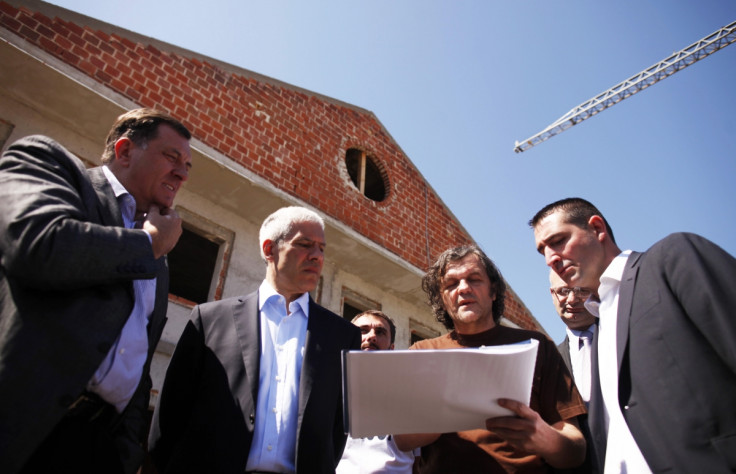Bosnia the Surreal: Emir Kusturica's Fantasy Town Erasing the Brutal Past

Entering Andricgrad, the controversial and ambitious "town within a town" built by filmmaker Emir Kusturica in celebration of literature and culture, is like something out of a Jorge Luis Borges book.
Every stone in the town, from the 19<sup>th century-like Spanish 'Francisco Goya' café to the Orthodox Church that rises like a lighthouse on the Drina River, echoes The Bridge on the Drina, the 1945 masterpiece by Nobel prize-winning writer Ivo Andric.
The book, published in 1945, captures the history of the uneasy relationship between the cultures of Christian Europe and the Islamic Ottoman Empire through the bloody story of the 16th century Mehmed Pasa Sokolovic Bridge that was built in Visegrad.
Cannes double winner Kusturica (Underground, Time of the Gypsies) conceived Andricgrad, which is due to be inaugurated on 28 June, as a tribute in stone to the great writer.
Everything from Thomas Mann Street to the multiplex cinema "Dolly Bell" breathes art and literature. Andricgrad also features an Austro-Hungarian academy of fine arts, a wine-tasting bookshop promoting Kusturica's own book, an opera house dedicated to Italy filmmaker Luchino Visconti where Kusturica plans to stage the premiere of his opera, based on Andric's masterpiece.
A joint project between Kusturica (who has 51% of the share) and the government of Republika Srpska, the Serbian enclave carved out after the 1992-95 war, the theme park cost between €10m and €12m.
Fantasy town

The project is controversial to say the least as it has been raised on the site of a sports centre that was used as a detention camp during the war. About 3,000 Bosnian Muslims were killed in Visegrad on or near the 11-arched bridge. Before the war 63% of the town's 25,000 inhabitants were Bosnian Muslims. Despite the Dayton Peace Agreement, which called for the Bosnian Muslims (known as Bosniaks) to be able to return to their homes, only around 5% have come back.
Bosniak activists such as Bakira Hasecic, who was raped at Visegrad police station by Serb paramilitary leader Milan Lukic and after the war founded the Association of Women Victims of War, say they would never put a foot in Kusturica's fantasy town.
"I would never enter Andricgrad even if my life depends on it," she told IBTimes UK. "On 26 May 1992 along [what has become] the access road to Andricgrad the first buses for Bosnian Muslims who were forced into exile [by Serb forces] used to pass. In the sports centre where we took our kids to play there was the biggest concentration camp for Bosniaks."
Supporters of Andricgrad dismiss those claims as propaganda. They maintain that the construction provided much-needed jobs to Bosniaks and Serbs alike.
The mayor of the town, Slavisa Miskovic, accuses media of political manipulation. "No one in Visegrad is against Andricgrad," he told us. "Andricgrad is supported by the majority of Visegrad inhabitants."
But his remarks are dismissed by the president of the Islamic community, Bilal Memisevic. "The mayor lies. The mayor does not support Andricgrad. His 'grace' still has not had a coffee in Andricgrad."
Rationalist architecture and metaphysical art

Erected on a stretch of land between the emerald green Drina and a tributary, Andricgrad strikes the visitor as a pastiche of Bosnia's different history and stiles, where rationalist architecture and metaphysical art meet literary theme park.
Labelled a "time machine" by the official guide, it resembles more a nightmarish but fascinating caprice of genius. Behind a Serbian castle, Ottoman houses lead to a Byzantine tower; the main street is a clear example of Austro-Hungarian style.
Music pours out of Goya café into the empty Nikola Tesla town square, built in Renaissance style, where Ivo Andric's black figure stands, unaware of controversies.
Kusturica himself is a controversial figure. He renounced Islam, despite being born Bosniak, and aligned himself with the Serbs. Local papers described project as "the unfortunate encounter between a limited imagination and poor knowledge of the past".
Memisevic says: "It is politically dangerous because once the construction work has finished, Emir Kusturica is planning to shoot a movie based on Ivo Andric's novel.
"The novel itself is a masterpiece in literary terms, but ideologically it is very dangerous work, because as every educated Bosnian Muslim knows it was commissioned by the Serbian Academy of Sciences and Arts of that period."
Memisevic says that in the book and in the film script the role of Bosniaks "will be mocked in relation to what we really are".
"We are native European and with the Ottoman Empire we have nothing in common besides religion," he says.
"The director says that Andricgrad is a time machine through Visegrad. Every culture is represented there besides mine. What kind of time machine is that?"
© Copyright IBTimes 2025. All rights reserved.






















